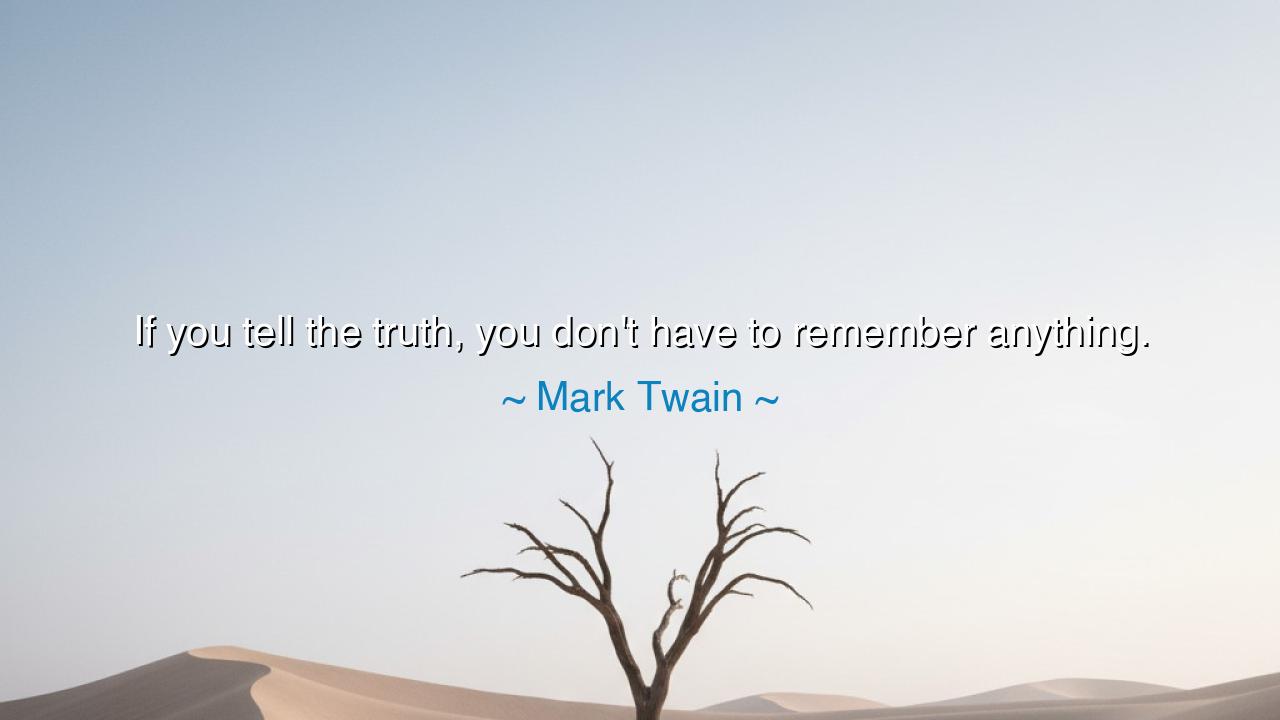
If you tell the truth, you don't have to remember anything.






Hear the wise and piercing words of Mark Twain, master of wit and truth, who declared: “If you tell the truth, you don’t have to remember anything.” At first glance, this saying seems almost playful, yet beneath its humor lies a profound law of life. For lies are heavy burdens, chains that bind the mind with constant effort. To deceive is to weave a net in which one’s own soul becomes ensnared, forever forced to recall each thread lest the whole design unravel. But truth is light, effortless, free. When one speaks it, the memory need not strain, for reality itself holds the record.
The meaning of Twain’s words is both practical and eternal. A liar must become a slave to his invention, rehearsing falsehoods, aligning stories, and fearing discovery. Every conversation becomes a battlefield of memory, where one misplaced detail may expose the lie. But the speaker of truth walks in peace, unafraid, for what he has said aligns with what is. No act of memory is required; no rehearsal of fiction is necessary. He can walk forward with a light heart, because the truth carries itself.
The ancients understood this wisdom well. The philosopher Plato taught that the soul weighed down by deceit is disordered, unable to harmonize with the eternal forms. In contrast, the truthful soul is at rest, aligned with the good and the just. In this way, Twain echoes the old teaching: truth is not only moral, but liberating, freeing both memory and spirit. The liar wears a mask that grows heavier with time; the honest man walks barefaced, untroubled.
Consider the tale of George Washington and the cherry tree. Though perhaps legend, it endures because it illustrates this very principle. When asked if he had struck the tree, young Washington confessed, “I cannot tell a lie.” His honesty freed him from the exhausting task of deception and earned him trust that endured into his manhood. Whether myth or memory, the story stands as a testament: truth requires no defense but itself.
History also warns us of the opposite. Think of Richard Nixon, whose intricate web of lies during the Watergate scandal demanded endless invention and concealment. The effort to preserve the deception consumed his presidency, and at last the net collapsed upon him. Here Twain’s wisdom is revealed in tragedy: had truth been spoken, there would have been no need to remember so many falsehoods, no downfall born of secrecy. Lies devour the liar; truth sustains the honest.
Yet Twain’s words are not meant only for the powerful; they are for all souls. In daily life, when we lie—to protect pride, to escape blame, to win favor—we burden ourselves with chains. We create a shadow-world that must constantly be remembered, guarded, and defended. But if we choose truth, even when it is painful, we live unburdened. The mind is free to dwell on creation, love, and purpose, instead of endlessly rehearsing falsehood.
The lesson, children of tomorrow, is this: live so that your words need no defense. Speak truth, and let memory be free to serve wisdom rather than deceit. Do not weave falsehoods, for they will entangle you. Choose instead to walk in honesty, and your spirit will be as light as the wind.
Practical is this path: when tempted to lie, pause and remember the burden it will place upon your memory. When you err, confess it; when you speak, let your words reflect reality. By doing so, you will live with a clear mind and a free heart. For as Mark Twain has taught, if you tell the truth, you don’t have to remember anything—and in that simplicity lies the deepest freedom.






NHHanh Nguyen Hong
I find this quote powerful because it challenges the way we live our lives. How many times do we have to remember what we said, or even who we said it to, because we weren't completely honest? The more I think about it, the more I realize how much mental energy goes into maintaining falsehoods. But then I wonder, is complete honesty truly attainable, or do we sometimes hide behind partial truths for self-protection?
BLNguyen Thi Bich Loan
Twain’s quote offers a certain kind of freedom, doesn’t it? The idea that you don’t have to remember anything if you're truthful is appealing. But, can the truth sometimes be too much to handle? Could it ever be easier to forget certain truths than face them? Is it possible that this simple wisdom becomes harder to apply in real life when the truth might hurt someone or ourselves?
Cchi
This quote got me thinking about how exhausting it can be to keep up with lies. Each lie requires another layer to cover it, and eventually, you can get tangled up in your own web. But, does telling the truth really make life simpler, or is it that we, as humans, sometimes create complexity where there is none? Can we train ourselves to always tell the truth, or are there inherent human tendencies that lead us to lie?
Cchiharu
Mark Twain’s quote made me reflect on the simplicity of honesty. If you tell the truth, there’s no need to keep track of lies or remember what you said. It seems so much easier to just be truthful. But is it always easy to tell the truth? Are there situations where telling the truth might actually complicate things? Is there ever a time when a small white lie could be a better choice?